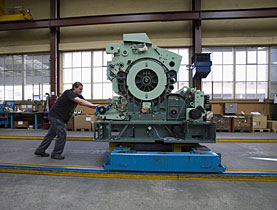Short-term solutions could ease recession woes

Swiss businesses should counter rising unemployment with short-term solutions as the country struggles through a recession in 2009, according to an economic expert.
Giovanni Ferro Luzzi, professor at the department of political economy at Geneva University, tells swissinfo that government projections that there will be 200,000 jobseekers by 2010 are not surprising.
As a stopgap until the economy recovers from the impact of the financial crisis, he recommends companies introduce short-term working, where staff take unpaid leave instead of redundancies.
The State Secretariat for Economic Affairs (Seco) delivered a sombre picture of the state of the Swiss economy on Tuesday, revising its previous prediction of a 0.8 per cent decline in gross domestic product (GDP) and severe job losses.
Unemployment, which rose to 3.4 per cent in February, would increase to 3.8 per cent in 2009 as a whole and to 5.2 per cent in 2010, a 13-year high.
But economists are relatively optimistic about conditions after 2010, with Seco predicting a 0.1 per cent growth in GDP in 2010.
swissinfo: Seco has predicted unemployment will rise from 3.4 to to 5.2 per cent in Switzerland by 2010. Was this increase expected?
Giovanni Ferro Luzzi: Yes, definitely. The economy has now entered into recession and unemployment always follows the economic cyclical trend, albeit with some delay.
Companies in the first instance try to minimise layoffs. They want to retain their workforce, often made up of trained workers, because the rotation of labour can be costly. But given the economic situation, many companies cannot help but cut staff.
swissinfo: For the moment it is mainly the construction and electronic industries that have suffered, offering staff short-term working conditions and redundancies. Will other sectors be seriously affected in the coming months?
G.F.L.: The financial sector has been directly affected by the crisis. The service industry depends greatly on industry and if industry limits its economic activity … services will eventually have to review their workforces. I imagine many businesses in the export sector, which is very exposed and dependent on the economic climate, have had to start making redundancies.
Everything that concerns basic needs – housing and nutrition – is generally less affected. Even if people are unemployed they still need somewhere to live, but perhaps in times of economic crisis they will think twice before buying a house. Currently however the situation is somewhat ambiguous because mortgage rates are extremely low. There are some areas that are likely to be more affected, such as second homes.
swissinfo: Short-term working can ease the situation. Could this system limit the damage in the long-term?
G.F.L.: Short-term working is the ideal instrument for weak economic periods like the current situation. It is a very useful tool for resolving temporary problems. In my opinion it should be developed further because it avoids a long-term reduction in staff. It is much less traumatic for the employees and also for the employers who don’t have to worry about finding staff who already know the company.
When you have a recession, short-term working should be used more systematically. But if a company has structural problems it is an ineffective tool because there is no certainty that its activities will resume to what they were before.
swissinfo: In recent months unemployment has increased significantly, particularly among young people. Is this a cause for concern?
G.F.L.: In a period of economic crisis young people are probably the first affected, simply because they cannot find work once they finish their studies. This kind of unemployment is somewhat traumatic for young people but it is worse for older workers. If a 54-year-old employee loses his job it is much more traumatic and difficult to find a new one.
Young people are more flexible. They can find a job later and perhaps do more training in the meantime. That is something we have observed recently, people prolonging their studies so as not to waste their time and they are better trained as a result. But someone who is 50 has trouble returning to further education.
swissinfo: The financial crisis has had far more devastating repercussions on job markets in many European countries than it has in Switzerland. Why is Switzerland feeling the effects later than elsewhere?
G. F. L.: There are several reasons. Maybe the economy held up better thanks to the optimism of businesses that probably thought the decline would be worse outside Switzerland.
As regards the labour market, the Swiss are more flexible. Companies in France, Spain or Germany that have to lay off staff may do it well in advance because it is a very expensive process. In Switzerland however a firm does not need to develop strategies before making redundancies and it is less costly.
More generally, a number of factors contribute to the fact that unemployment is lower in Switzerland, not least the vocational training system. Apprenticeship, for example, makes it easier for young people to enter the job market.
swissinfo-interview: Daniele Mariani
Official government figures, released in March, showed real GDP shrinking 0.6% in the last quarter of 2008 compared with the same period in 2007 (-0.3% quarter on quarter). Provisional figures showed the economy growing by 1.6% for the whole of 2008.
The export of goods and services plummeted by 8.1% quarter on quarter while imports also fell by 5.8%. Domestic consumer spending grew only by 0.1%.
Economists are predicting tougher times for this year and next:
Seco: -2.2% GDP in 2009, 0.1% in 2010
SNB: -2.5% to –3% 2009
UBS Wealth Management: -1.2% 2009, 0.2% 2010
Credit Suisse: -0.6% 2009
BAK Basel Economics: -2.1% 2009, 0.6% 2010
OECD: -0.2% 2009, 1.6% 2010
Young people are likely to bear the brunt of the emerging recession with an estimated 10,000 more people aged 25 and under facing unemployment in 2010, the Swiss Trade Union Federation has estimated.
More than 30,000 workers in that age group were likely to have no job next year as the economic downturn continued, the federation said – a 50 per cent rise on the current official figure.
The number could actually be much worse as about half of jobless youths today are not registered with unemployment services and do not figure in official statistics.
The federation also says internships and training positions are likely to dry up. At the moment, about 20,000 youths are waiting for training positions.
If businesses cannot create those opportunities, the trade federation suggests the public sector should step in and offer young workers more full-time places at professional schools.

In compliance with the JTI standards
More: SWI swissinfo.ch certified by the Journalism Trust Initiative





You can find an overview of ongoing debates with our journalists here. Please join us!
If you want to start a conversation about a topic raised in this article or want to report factual errors, email us at english@swissinfo.ch.